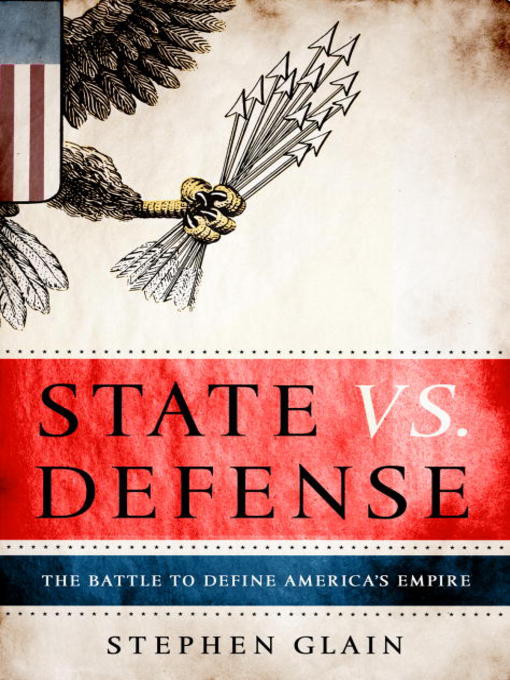
State vs. Defense
کتاب های مرتبط
- اطلاعات
- نقد و بررسی
- دیدگاه کاربران
نقد و بررسی

Starred review from June 15, 2011
The perils of an expanding American hegemony by military means rather than diplomacy, as skillfully tracked by an American journalist.
In this timely, pointed study, Glain (Mullahs, Merchants and Militants: The Economic Collapse of the Muslim World, 2004, etc.) challenges the efficacy and wisdom of continuing an enormous, costly U.S. defense buildup abroad in the face of the flimsiest excuse for an enemy and where statesmanship would better be served. Since after World War II, American leaders, much like republican Rome, writes the author, "realized their founders' dread by succumbing to the sirens of militarism and the costs of their rapture." During the same timer period, the hawks have held sway over national leaders. Examples include: General MacArthur's hyperbolic pronouncements of communist incursions, which neutralized the restraint preached by George Marshall; the co-opting of George Kennan's theory of containment by Dean Acheson and others in forging the Truman Doctrine; the pernicious fear-mongering of Senator Joseph McCarthy that effectively cowed the Department of State. The Soviet threat (and communist China) would keep alarmists and neoconservatives frothing at the mouth through wars in Korea and Vietnam, fed by defense contractors, RAND Corporation analysts and nuclear-bomb fears—despite ample evidence that the Soviet Union was "sclerotic" and incapable of posing a serious existential threat to the U.S. The myth of Soviet superiority was barked by the White House, swallowed by the press, cheered by the Pentagon and carried the country through the pitiful collapse of the Soviet Union. However, our "enemy deprivation syndrome" was later filled by the Islamist terrorist threat. Desert Shield and consummate generals such as Colin Powell brought the "romance with the military" to primetime. The momentum of militarization has become unstoppable, Glain writes gloomily. In crisp, authoritative writing, the author sets down some scathing portraits, from MacArthur to Rumsfeld, and in a powerful conclusion, exposes the disequilibrium between the U.S. civilian versus military resources throughout the world and the continued "appeasement" by President Obama to the Joint Chiefs of Staff.
A work of smoldering focus and marshaled evidence that just might have found its publishing moment.
(COPYRIGHT (2011) KIRKUS REVIEWS/NIELSEN BUSINESS MEDIA, INC. ALL RIGHTS RESERVED.)

July 1, 2011
Since the early years of the Cold War, the U.S. State and Defense Departments have been locked in a bitter fight over making foreign policy--a battle in which Defense has dominated to the extent that the national security budget is now 20 percent of the total federal budget (i.e., rather than there being a greater percentage for diplomacy or foreign aid). So writes journalist Glain (Wall Street Journal; Mullahs, Merchants, and Militants: The Economic Collapse of the Arab World) in his fascinating account of the making of modern foreign policy. This is not a comprehensive Cold War history, but it skillfully investigates each presidential administration since Truman's to show how militarists--often wealthy corporation heads and elected officials--have created the military-industrial complex that President Eisenhower warned against. Readers will be familiar with many of the militarists and diplomatists who fill these pages but will likely be angered about the extent to which the former went to distort the truth about the former Soviet Union and, later, Asian and Muslim nations' strength and intentions toward the United States. VERDICT This frank and absorbing interpretation offers a well-constructed framework for viewing foreign policy; it will interest general readers, scholars, and appointed and elected officials. [See Prepub Alert, 2/21/11.]--Karl Helicher, Upper Merion Twp. Lib., King of Prussia, PA
Copyright 2011 Library Journal, LLC Used with permission.

August 1, 2011
The image of the U.S. around the world is projected not by diplomats or doctors but by soldiers, a presence more consistent with an empire than a republic, asserts foreign correspondent Glain, who spent 14 years in Asia and the Middle East. Because of its budget and political clout, the Defense Department has come to have a greater presence abroad than the State Department. U.S. military forces abroad grew significantly during the Cold War and the heightened sense of a Communist threat and hasn't receded with the collapse of the Soviet Union. Indeed, it threatens to fan aggression with China. The U.S. has neglected the budgets of diplomats and allowed language skills and morale to erode even as it has failed to adapt to changing geopolitics that include rising regional powers, Glain says. He analyzes U.S. defense policy since 1947, showing how we have arrived at our current situation of having a volunteer military and a civilian population with little connection to war other than through paying the enormous financial price of supporting it.(Reprinted with permission of Booklist, copyright 2011, American Library Association.)

























دیدگاه کاربران